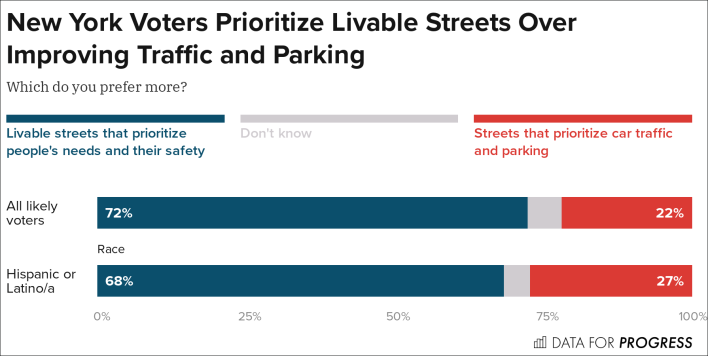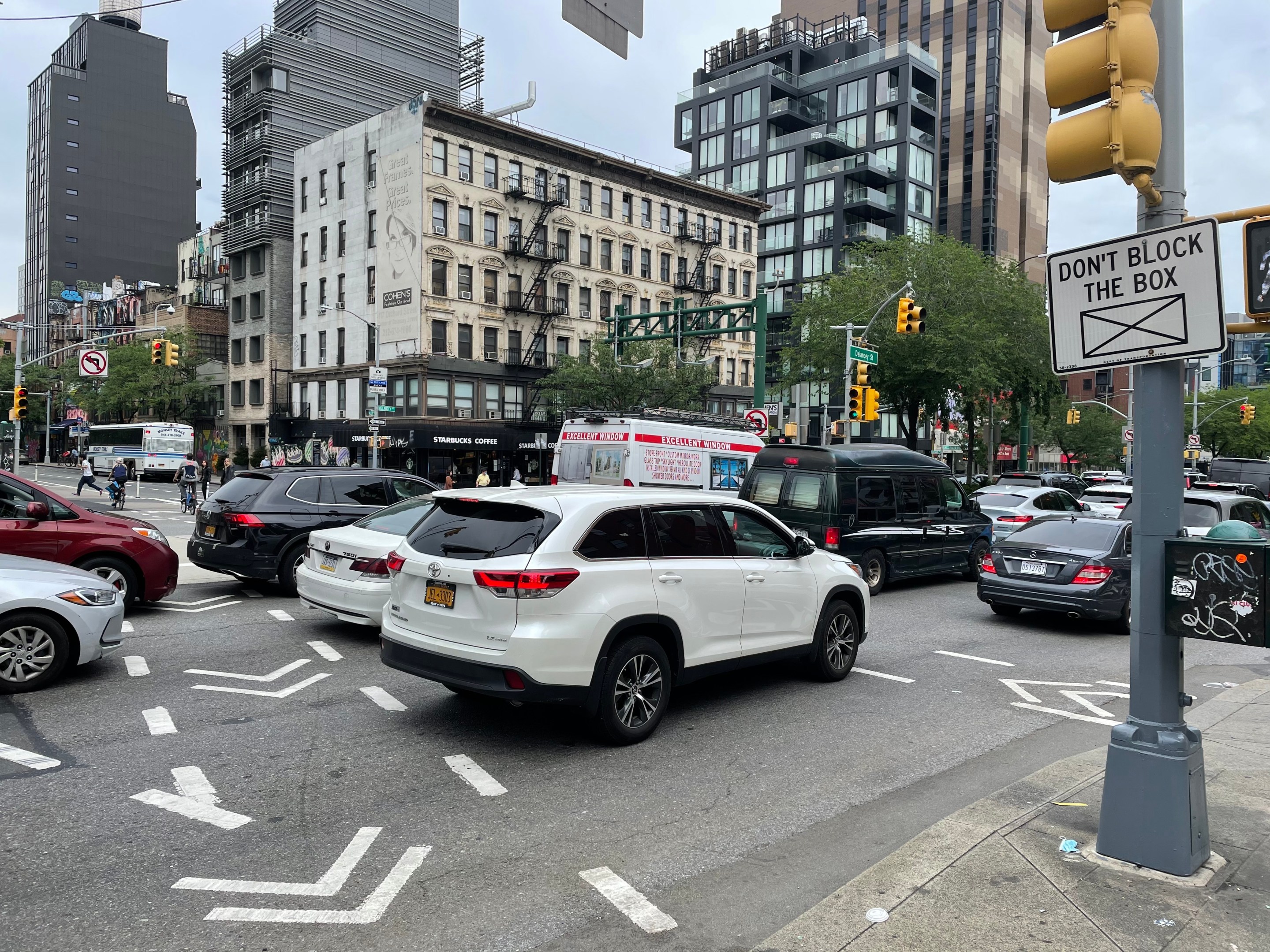These debates have no street cred.
If you've tuned into the handful of televised Democratic primary debates so far, you might walk away with the impression that New York City is one squeegee man away from descending into a Taxi Driver montage. When moderators aren't trying to openly bait candidates into a crime-off ("Would you take guns away from the police?"), the naked fear of urban decay overwhelms important topics, such as transit, the housing crisis, and even getting more New Yorkers to ride bicycles.
The increase in shootings and homicides is real and cannot be ignored, but some perspective about where the city is (nowhere near the levels of violent crime seen in the early-to-mid-1990s) would lead to better questions (or any!) about two issues that voters deeply care about: transportation and the environment. A recent Siena College poll showed that vast majority of New Yorkers — 85 percent — support pedestrianizing cities; 61 percent are "very concerned" about air pollution, and 60 percent believe that policies designed to combat the climate crisis will help the economy.
There's been a severe lack of questions about transportation, infrastructure & climate in the mayoral debates.
— Transportation Alternatives *Vote on Sammy's Law* (@TransAlt) June 16, 2021
So...we teamed up with other orgs & wrote dozens of sample questions on these topics before the final debate tonight.
Statement & questions ➡️ https://t.co/hrmrPm9ouG pic.twitter.com/vqiMxOo1gH
A Streetsblog-commissioned poll by Data For Progress also showed intense interest in livable streets. For instance, 52 percent of respondents said traffic "reduces the quality of life" of their neighborhoods (versus 23 percent who said it didn't), and 58 percent supported "transforming our streets so that they are safe enough for kids to bike to school, even if that means removing parking, slowing down traffic, and closing some streets to automobile traffic."
Yet debate moderators don't ask about that. We asked Mayor de Blasio on Tuesday why the debates have included virtually no discussions about how we get around.
"It is natural, in politics, in media, in government, to be a little too tethered to the past. What’s obvious to me is that, this is a city that in the future is gonna involve a lot more mass transit, a lot more walking, a lot more biking. It’s gonna be a different city," de Blasio said. "And we do need to end our deep, deep reverence for the automobile as a society, in general."
The third and final debate is scheduled for Wednesday night from 7 to 9 p.m. No doubt the good people at WNBC-TV, Telemundo 47, Politico, the Citizens Budget Commission, and the New York Urban League have it covered. But just in case, here are some humble suggestions from Streetsblog's brain:
What specifically will you do to reduce car usage across New York City?
We'll start off with the question posed by Mayor Bill "I Have Used A Fleet of SUVs To Get to Work for Nearly Eight Years (Except For That One Time A Few Weeks Ago)" de Blasio. Carbon emissions from vehicles now comprise the majority of the city's air pollution, and those levels have essentially remained the same since 2005. Car registrations climbed during both the Bloomberg and de Blasio administrations, and last year they exploded after the first few months of the pandemic.
As long as there are literally millions of vehicles on the road, it will be impossible to speed up bus times or deepen the cycling boom.
"If we don't address this, we’re never gonna be able to accomplish those other goals," said Danny Pearlstein, policy and communications director at Riders Alliance.
Related question: "What is a car sewer?"
As mayor, will you start charging drivers for residential street parking?
New York is the only major city in America that doesn't charge drivers to store their private cars in the public right of way. The city has three million public spaces total, equivalent to roughly 12 Central Parks in public space that is being used for vehicle storage (when you include all spaces, that number climbs to more than five million). Voters approve of removing parking spots for bike and bus lanes, and open streets and outdoor restaurants. (In our poll, 72 percent of voters said they prefer livable streets that priorities people, not parking.)

Andrew Yang, Scott Stringer, Eric Adams, Kathryn Garcia and Dianne Morales have all expressed support for Transportation Alternatives's plan to repurpose 25 percent of car storage space by 2025.
But are any of these candidates brave enough to say they'll start charging for something that's free? (Answer: Free parking isn't free. It costs pollution, traffic crashes, stress and heartbreak. Just ask Donald Shoup, please.)
Related question: "Do you support ending residential parking minimums for new development?"
What is your specific strategy for waterfront development?
Mayor Bloomberg was lauded for taking climate change seriously and creating a real resiliency plan for New York City. But after Superstorm Sandy, he also pledged to not "retreat" from building lots of stuff right next to the water. De Blasio has essentially carried on this legacy, even as sea level rise threatens the tiny islands we all live on.
"A lot of the loans and financing for some of the waterfront projects, they’ll give you a 30-year time horizon. Those buildings will be around longer than that. But after those 30 years?" says Kate Slevin, the senior vice president of state programs and advocacy for the Regional Plan Association. "That kind of long-term thinking is hard."
Related question: "What is 'strategic retreat'? And do you support it?"
Should the NYPD be enforcing traffic violations?
Earlier this year, the City Council passed a law that will transfer the duty of investigating serious crashes from the NYPD to the Department of Transportation. The move was hailed by safe streets advocates, since far too many of the police's crash investigations have proven to be shoddy or incomplete.
But cops are still supposed to issue tickets to people parked in bike lanes, or double parked in a bus lane, or sprawled across two bike lanes and a roadway, even as they enjoy doing it themselves.
"The police are uniquely unsuited to enforce the traffic law because they violate it with impunity," Harris said.
Related question: "Will you commit to eliminating city-issued parking placards by the end of your first term? Why or why not?"
How will you address noise pollution?
It's been more than 40 years since a landmark study showed that elevated subway noise negatively affected the ability of New York City schoolchildren to learn, and the city has only gotten noisier. Noise is far and away the most common 311 complaint.
New Yorkers don't have to live with the high blood pressure, sleeplessness, and hearing loss that comes with a city that's too noisy. Stringer is the only candidate so far to release a comprehensive plan to address the problem that focuses on banning unnecessary helicopter flights, turning the volume down on sirens, and setting up decibel readers to target"hotspots."
Related question: "How will you get rid of helicopters?"
What's a city infrastructure project completed during the last four years that you think took too long and cost too much? What would you have done differently?
Construction costs are eye-wateringly high in New York City, and the red tape is prodigious.
"Whether it’s a street reconstruction project that takes years and years, or a big transit project that takes decades, all of these projects take way too long in New York, and they cost way too much," Slevin said. "What are they going to do about it?"
Related question: "How long will it take your administration to put a new bike lane on the Brooklyn Bridge?"
Lightning round:
Do you support the construction of the Triboro RX?
Will you commit to fully funding the city's Fair Fares program to meet demand?
Who are you considering as your next DOT Commissioner?
Will you bring back Birdie, as Kathryn Garcia has promised to do? Or do you have another environmental mascot in mind for NYC?
This story has been updated to reflect Kathryn Garcia's campaign pledge to bring back Birdie.






